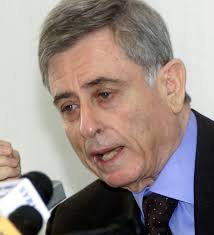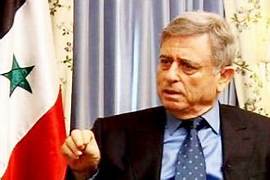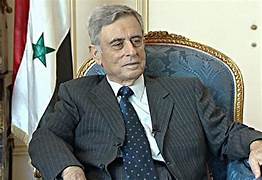Former Syrian Vice President and leader of the National Salvation Front, Abdel Halim Khaddam, stated that “the Syrian regime is struggling with its recent sugar.”
Khaddam, in an interview with the Italian news agency Aki, expressed that “the follies and mistakes made by the rulers of Damascus, along with the nature of the regime itself, are no longer compatible with the current era. It is a system that has fostered and practiced tyranny, repression, corruption, and the promotion of sabotage both domestically and abroad.”
Regarding the internal situation, the former Syrian Vice President reiterated that “the regime’s structure is authoritarian, as evident from today’s speech, which showcased a totalitarian identity, as seen in Bashar’s remarks. We have prioritized stability over freedom, as instability leads to chaos and hinders the country’s development.” He then posed a surprising question, stating, “Since when does freedom produce chaos?”
He further added, “On the contrary, repression is what produces chaos, creating a conducive environment for the emergence and growth of extremist organizations.” Khaddam emphasized that “the stability resulting from the emergency laws in place for 44 years, the curtailment of freedoms, arbitrary arrests, and the imprisonment of free individuals is destabilizing and distorted.”
The prominent Syrian opposition figure expressed his astonishment at Bashar Al-Assad’s claim of practicing the so-called National Progressive Front for Democracy. He remarked, “The National Front is like a scrap car that deserves nothing but pity. Can any Syrian believe Bashar’s reforms? How can the postponement of reforms be justified due to external pressure? It is widely known that the state requires internal reforms during times of pressure to strengthen national cohesion. It is impossible to deal with unfavorable international conditions while corruption, chaos, and nepotism prevail throughout the public administration, with the security services applied accordingly. The citizen’s breath remains the same as it is now in Syria.” He added, “This is the natural result when one person holds the positions of president, prime minister, minister, and director of the intelligence branch simultaneously.”
Regarding economic development, Khaddam pointed out that the Syrian president’s claims about 5.5% growth did not benefit the majority of the Syrian people. He remarked, “Let’s examine the outcomes of the regime’s economic policies. A new privileged class has emerged in society, consisting of the ruling family, its entourage, and its collaborators, which has later transformed into a political class that serves as its puppet in managing the country’s affairs.”
He referred to the statement made by the Syrian president that “corruption stems from home education.” He questioned, “Does this imply that the relatives of the Syrian president, who went from extreme poverty to immense wealth within a few years, achieved this due to their extraordinary brilliance, professional competence, or other reasons?”
Khaddam specifically mentioned “Jamil Al-Assad, the uncle of the Syrian president,” who, as he stated, “was an officer earning a monthly salary of no more than 300 Syrian pounds in the seventies. However, when he passed away, his wealth exceeded four billion Syrian pounds.” He also mentioned another uncle of the Syrian president, “Mohammed Makhlouf, whose salary as an airline employee was 300 Syrian pounds, but now possesses billions of dollars in wealth.” Additionally, he highlighted Rami Makhlouf, Bashar Al-Assad’s cousin, who currently holds significant control over the local economy, despite being a recent graduate and reportedly not as successful as the people from the ruling class. He questioned, “How did Rami Makhlouf become one of the wealthiest Arabs?”
Regarding the next steps to be taken by the National Salvation Front internationally and in the Arab region, Khaddam stated, “The Front will soon convene a meeting of the General Secretariat. Several topics will be discussed, including the regime’s policies and practices. Further actions will be announced in due course.”
The former Syrian Vice President ridiculed the remarks made by Syrian President Bashar Al-Assad in his recent speech on Arab nationalism, stating, “National thought is not merely a spoken word but a culture and a practice. How can we imagine that this thought, which has failed to comprehend national unity and has committed major mistakes leading to divisions and fractures within the country’s internal structure, is capable of generating a national thought that consolidates Arab action?” He questioned, “Is the detachment from the Arab world and the willingness to align with Iran a result of national thought?”
On the Lebanese issue, Khaddam, who has been involved in it for many years, emphasized that there is evidence of the regime’s involvement in fueling the sectarian crisis in Lebanon, particularly in relation to the Fatah al-Islam issue. He questioned, “Where did Fatah al-Islam acquire such a large quantity of explosives and weapons that are not even under the control of the Lebanese army itself?” He highlighted that the weapons were supplied by the Syrian regime since Fatah al-Islam is an organization established by Syrian Military Intelligence and personally overseen by Asif Shawkat (the brother-in-law of the Syrian president and the head of Syrian military intelligence), along with several officers whose names cannot be disclosed due to ongoing investigations.
Khaddam emphasized that it is implausible to believe that Shakir Absi, the leader of Fatah al-Islam, managed to form an organization with such advanced weapons and experienced fighters in just five months.
He mentioned the threats made by Bashar Al-Assad, his deputy Farouq al-Shara, and his foreign minister, Al-Muallem, who repeatedly warned that Lebanon would face an explosion if an international tribunal were established for Hariri’s assassination. He questioned, “Are these threats to be ignored?”
Khaddam acknowledged that the regime is capable of destroying Lebanon easily. However, he emphasized that the consequences and repercussions of such destruction would be catastrophic for Syria itself. Encouraging and resorting to these methods only provide justifications for the growth and spread of extremism within Syria.
On the possibility of achieving peace between Syria and Israel, the former Syrian Vice President stated that Bashar’s mention of it is merely a desperate attempt to conceal his secret contacts. Khaddam observed that Bashar’s intention is to send a message to certain political factions in the Arab region, claiming that the secret negotiator Ibrahim Suleiman is a fabrication and emphasizing his adherence to principles. Khaddam emphasized that the Damascus regime lacks seriousness and capability in achieving peace, as any regime in Damascus can only produce a fragile and weak peace. He further added that Bashar is incapable of meeting the demands of the Israelis, making it impossible for Olmert or any other Israeli prime minister to make peace with the regime.
Regarding Rabin’s deposit, Khaddam mentioned that there have been discussions surrounding it, but they are merely verbal statements made by former Israeli Prime Minister Yitzhak Rabin to President Bill Clinton. These statements included security conditions related to the absence of Syrian forces, border control, and water. Khaddam expressed doubt that the late President Hafez Al-Assad could fulfill the conditions set by Rabin.
The former vice president of Syria accused the regime in Damascus of supporting terrorism in Iraq. He referred to an incident that occurred over a month and a half ago in the Iraqi city of Najaf, where a car containing a significant amount of explosives was discovered along with a booby-trapped tanker. According to Khaddam, these vehicles originated from inside Syria, indicating the involvement of the Syrian authorities, as such an organization cannot transport such a large amount of explosives from Syria without their knowledge. He questioned how the Syrian security services, known for closely monitoring the actions of Syrian citizens, could fail to monitor organizations involved in the preparation of explosive materials. Khaddam mentioned that these explosives were sent to factions in Najaf with close ties to the regime, particularly the Sadrist movement. He emphasized that the information he shared is not a mere accusation but rather facts announced by the Iraqi government over a month and a half ago.



